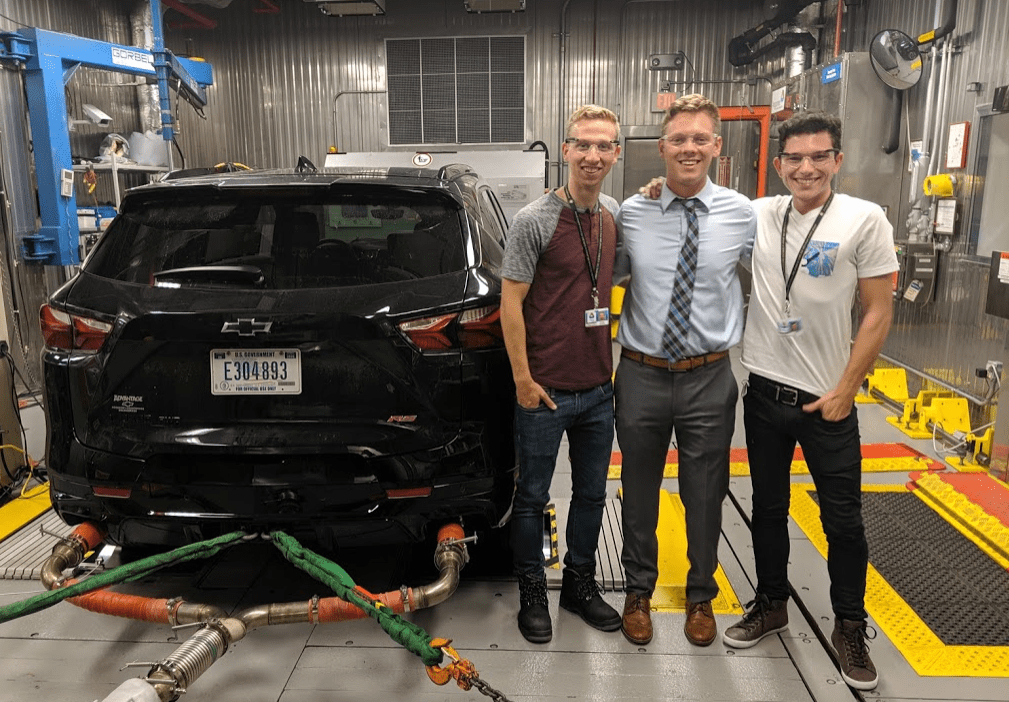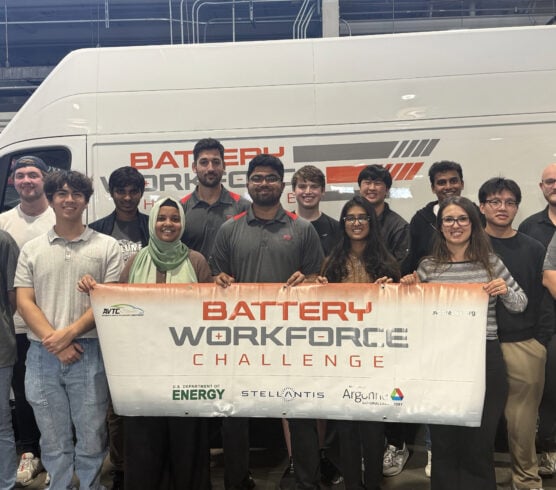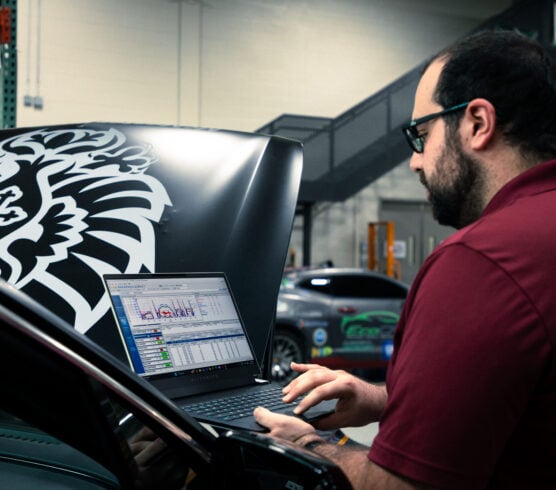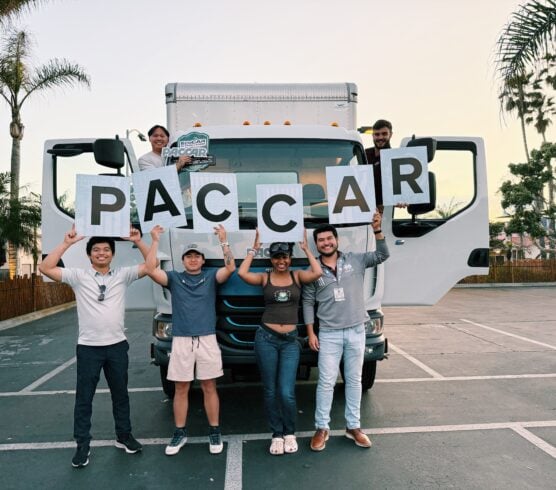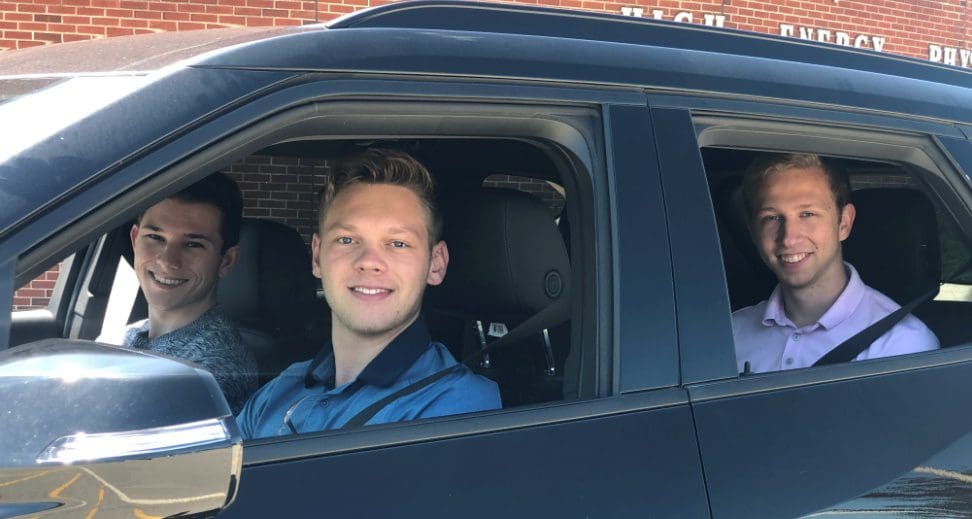 This year, three EcoCAR Mobility Challenge students spent the summer interning for the Advanced Vehicle Technology Competitions (AVTC) group at Argonn
This year, three EcoCAR Mobility Challenge students spent the summer interning for the Advanced Vehicle Technology Competitions (AVTC) group at Argonn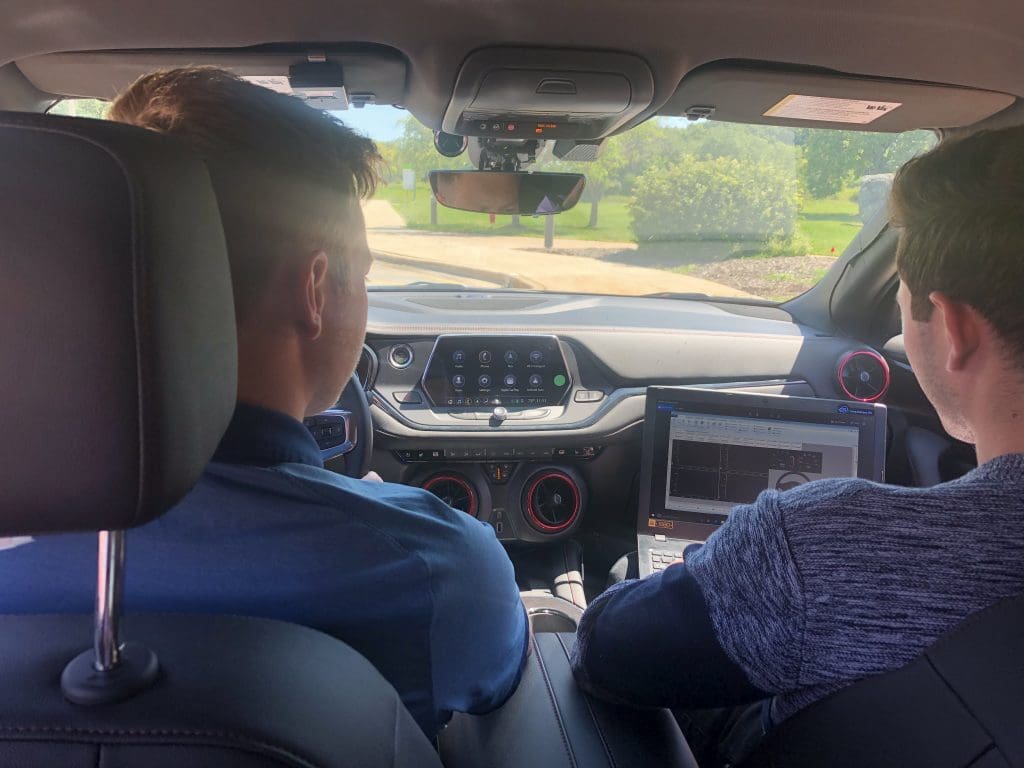 e National Laboratory (ANL).
e National Laboratory (ANL).
David Cicotte, Project Manager and CAVs Engineer from Embry-Riddle Aeronautical University, Alex Shiffer, Embry-Riddle Aeronautical University’s CAVS Senior Design Team Lead, and Tyler Krusen, PSI sub-team lead at Virginia Tech settled in just outside the “Windy City” to take on a plethora of projects this summer.
As a part of their summer internship, the three interns drove the 2019 Chevy Blazer 1,000 miles. The primary purpose was to accumulate miles on the vehicle so that it could be tested on a dynamometer because all vehicles must be “broken in” before they can be tested. This also served to record data on how the stock Chevrolet Blazer behaves. This 1,000 mile accumulation consisted of three main drives including trips to the home of the Chicago Cubs, Wrigley Field, and a “tour of Wisconsin” which included Madison, Fond du Lac, and Milwaukee.
Throughout the summer Alex worked together with EcoCAR teammate and fellow intern, David, to develop a bench-top Hardware-in-the-loop (HIL) setup to simulate the 2019 Chevrolet Blazer following a drive cycle autonomously.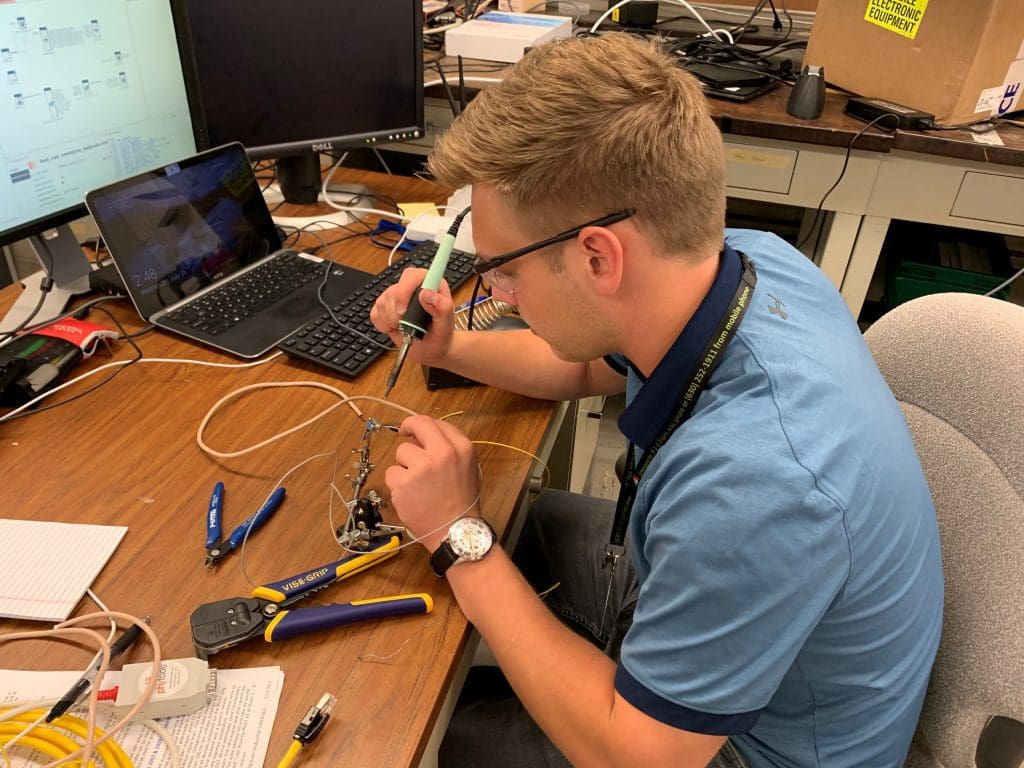 Alex also worked on setting up the Intel AIoT TANK to record and playback CAVS sensor data through RTMaps. The use of RTMaps will aid in team’s development of sensor fusion algorithms. Alex worked on outfitting Argonne’s Blazer with the mounts and wiring required for the Mobileye, TANK, MABx, and Vector Logger necessary for recording CAN data and future CAVS activities. During the mile accumulation test drives, Alex drove the Blazer and evaluated the limitations of the stock ADAS systems. Alex enjoyed visiting the city of Chicago’s museums, eating famous deep-dish pizza, and going to Zanie’s Comedy Club.
Alex also worked on setting up the Intel AIoT TANK to record and playback CAVS sensor data through RTMaps. The use of RTMaps will aid in team’s development of sensor fusion algorithms. Alex worked on outfitting Argonne’s Blazer with the mounts and wiring required for the Mobileye, TANK, MABx, and Vector Logger necessary for recording CAN data and future CAVS activities. During the mile accumulation test drives, Alex drove the Blazer and evaluated the limitations of the stock ADAS systems. Alex enjoyed visiting the city of Chicago’s museums, eating famous deep-dish pizza, and going to Zanie’s Comedy Club.
David explored many software related tasks pertaining to Connected and Automated Vehicle systems (CAVs) development activities. He particularly liked developing a Hardware in the Loop setup with two real-time computers for t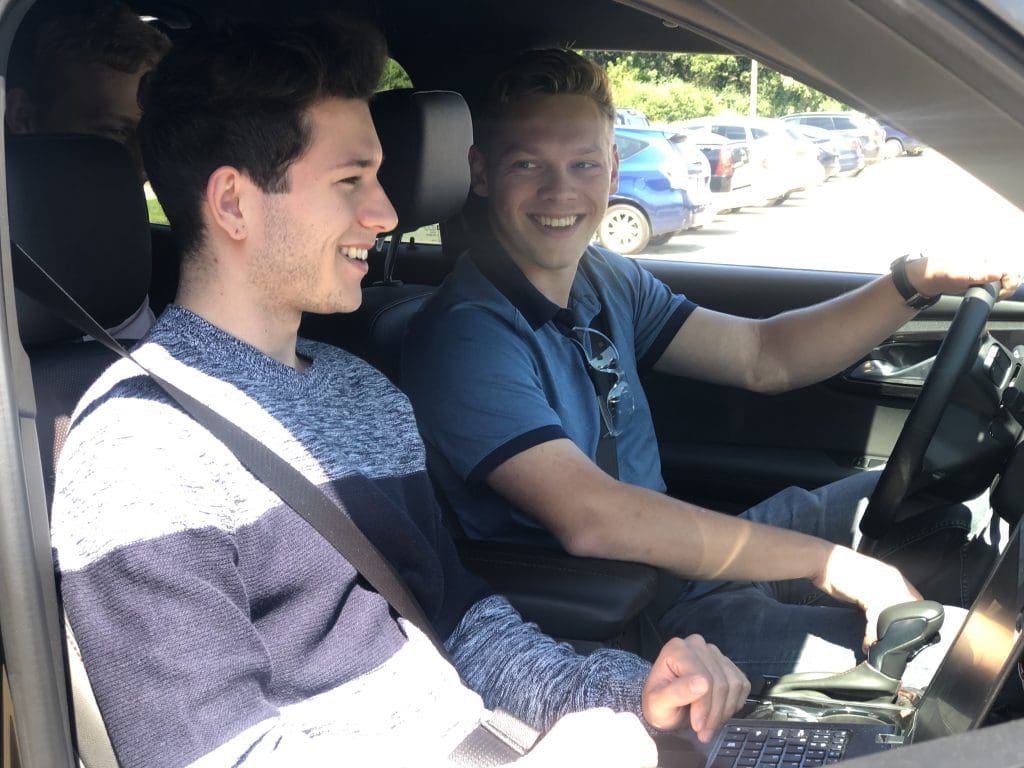 esting longitudinal control of a 2019 Chevrolet Blazer. He and Alex were able to work more in-depth with dSPACE in a one-on-one setting at ANL. David also created a few Controller Area Network (CAN) message loggers, one of which was used to record over 5 GB of data during the 1,000 mile test drive of the Chevrolet Blazer with his fellow interns. He also dove into the vehicle and utilized some of the Blazer’s signals to test out his CAN gateway, which will be useful when implementing some autonomous features with his CAVs team this next year. David enjoyed some long walks on the beach, a spending time in the city, and proposing to his girlfriend fiancé, Kate.
esting longitudinal control of a 2019 Chevrolet Blazer. He and Alex were able to work more in-depth with dSPACE in a one-on-one setting at ANL. David also created a few Controller Area Network (CAN) message loggers, one of which was used to record over 5 GB of data during the 1,000 mile test drive of the Chevrolet Blazer with his fellow interns. He also dove into the vehicle and utilized some of the Blazer’s signals to test out his CAN gateway, which will be useful when implementing some autonomous features with his CAVs team this next year. David enjoyed some long walks on the beach, a spending time in the city, and proposing to his girlfriend fiancé, Kate.
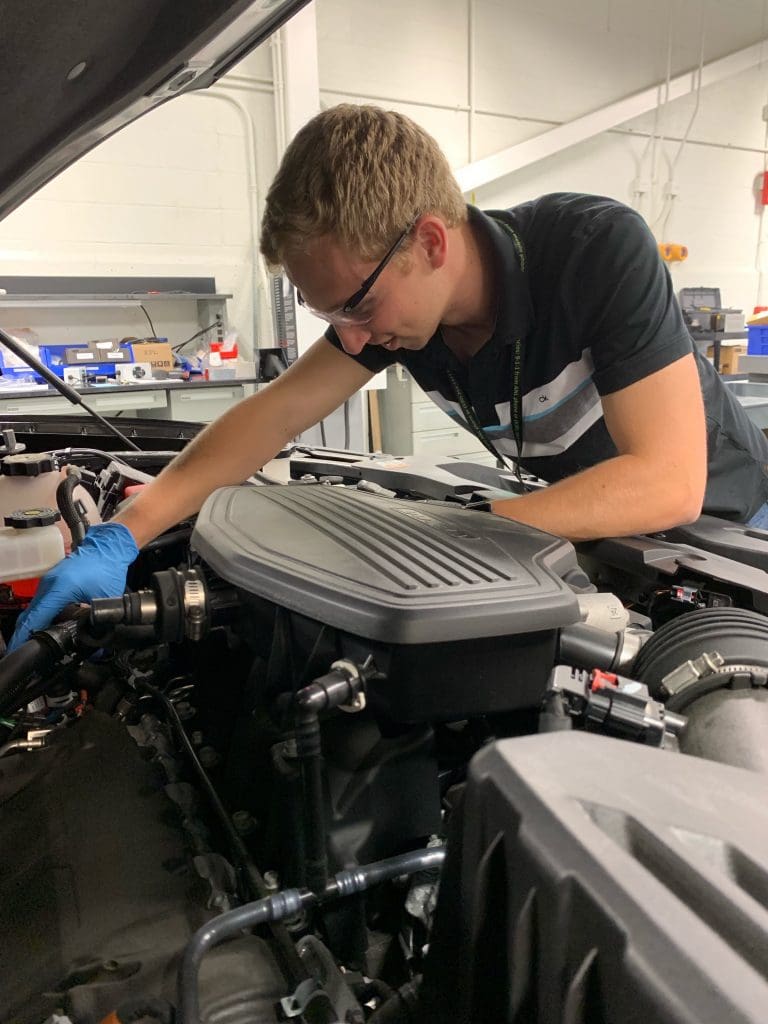 Tyler spent the summer assisting the ANL AVTC team with various projects including spearheading the transformation of the Safety Technical Inspection process. The Safety Tech Inspection is a mandatory vehicle check that all teams must complete before their vehicles can perform any other events. Along with this project, he worked on the implementation of a new fuel flow sensor, mounting of CAVs components, and both controlled environment and on road testing of a Chevrolet Blazer. His favorite project from the summer was the dyno testing of Chevy Blazer. Outside of ANL, he enjoyed exploring Chicago from the bean to the beaches to Wicker Park. Tyler will be returning to Virginia Tech to complete his senior year where he is pursuing his BS in Mechanical Engineering and will continue to be involved in EcoCAR as the PSI sub-team lead.
Tyler spent the summer assisting the ANL AVTC team with various projects including spearheading the transformation of the Safety Technical Inspection process. The Safety Tech Inspection is a mandatory vehicle check that all teams must complete before their vehicles can perform any other events. Along with this project, he worked on the implementation of a new fuel flow sensor, mounting of CAVs components, and both controlled environment and on road testing of a Chevrolet Blazer. His favorite project from the summer was the dyno testing of Chevy Blazer. Outside of ANL, he enjoyed exploring Chicago from the bean to the beaches to Wicker Park. Tyler will be returning to Virginia Tech to complete his senior year where he is pursuing his BS in Mechanical Engineering and will continue to be involved in EcoCAR as the PSI sub-team lead.
Together, all three interns provided instrumental data and support to the AVTC program. Thanks for a great summer!
